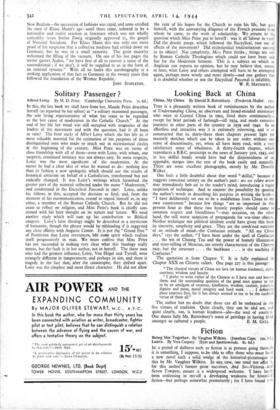Looking Back at China
China, My China. By Harold B. Rattenbury. (Frederick Muller. 15s.)
Tins is a pleasantly written book of reminiscences by the author of Understanding China, an observant and broad-minded missionary who went to Central China in 1902, lived there continuously— except for brief periods of furlough—till 1934, and made extensive journeys in other parts of the country in 1939 and 1940. In an effortless and attractive way :t is extremely informing, and is sa constructed that its thirty-three short chapters present light yet masterly sketches which can be taken in any order without any sense of discontinuity, yet, when all have been read, with a very satisfactory sense of wholeness. A thirty-fourth chapter, which reproduces a B.B.C. postscript to the news of January 31st, 1943, and in less skilful hands would have had the disjointedness of an appendix, merges into the rest of the book easily and naturally. There are some excellent photographs, mostly by Mr. Deaville One feels a little doubtful about that word "skilful," because it suggests conscious artistry on the author's part : ars en celare artem may immediately bob up in the reader's mind, introducing a vague suspicion of technique. And to counter the possibility by quoting the author's words in describing his purpose in writing the bcok- " I have deliberately set out to be a middleman from China to my own countrymen" because few things "are so important in this present hour as that these two historic peoples should come to common respect and friendliness "—may occasion, on the other hand, the still worse suspicion of propaganda for war-time objects. Neither technique nor political idealism could have given this book its sincerity, simplicity and grace. They are the comlz6ied outcome of an attitude of mind—the Confucian attitude. "All my China days," says the author, "I have been under the spell of Confucius . . . the wit of Chuang Tzu and the power of homely illustration and story-telling of Mencius, are utterly characteristic of the Chinese race, but the structure . . the backbone . . . is the teaching of Confucius."
The quotation is from Chapter V. It is fully explained in Chapter XXX on Chinese values. One page 227 is this passage:
"The classical virtues of China are love (or human kindness), right, courtesy, wisdom and loyalty.
"I prefer to write rather of the Chinese as I have met and known them, and the outstanding qualities of the good man appear to me to be an amalgam of courtesy, kindliness, wisdom, caution, patience, dignity and poise, moral integrity and hard work. . . . I definitely place courtesy first, for it has always seemed to me to be the cardinal virtue of them all."
The author has no doubt that these can all be embraced in the five virtues of tradition. Quite clearly, they can be ahd are, and quite clearly, too, is human kindness—j'en—the soul of courte,y. One shares fully Mr. Rattenbury's sense of privilege in having lived


























 Previous page
Previous page